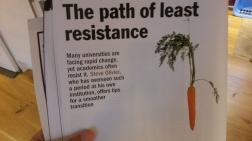“The one thing we all want to do is to engage our students”.
So began the Teaching and Learning Showcase on Diversifying the Curriculum that I attended at Reading yesterday. If my experience of this showcase of 5 different curriculum development projects across campus is anything to go by, the speakers know a lot about engaging students. Personal experience tells us that we learn more when we are engaged, and we engage when we can identify with what we are seeing, hearing and reading. Thus the recognition that diversifying our curriculum in terms of race and ethnicity is a natural conclusion in the light of the much publicised BME attainment gap in HE and the increasing diversity of the students in our global university.
Dr Rebecca Harris from the Institute of Education kicked off the session relating their personal experience teaching secondary school teachers to deliver a diverse syllabus in their schools. The issues raised by trainee teachers such as fear of offending no doubt also ring true for many of us, but can lead to “colour-blind” curricula which merely avoid the issue – often not successfully. Dr Harris also considered the concept of a “balanced” syllabus. As a climate scientist, I am used to talking, or indeed ranting, about the importance of a balanced approach in dissemination, but as was pointed out yesterday, even balance is a relative term and depends on the individual.
Dr Nicola Abram and Dr Nicole King from the School of Literature and Languages also talked about the importance of starting with a key part 1 module, in their case “Research and Critical methods”, so that students learn to challenge the classical canons of English Literature from the very start of their university career. This was achieved by adding new texts, for example essays by Zadie Smith and Chimamanda Ngozi Adichie. As this module involves around 200 students and therefore lots of staff, a happy by-product is that this redesign has also influenced other staff across the School.
Did you know that, as far as we are aware, Reading was the first UK University Department to hire a specialist lecturer in non-Western Philosophy? Nope, me neither. Dr Shalini Sinha now offers lectures and modules on Indian Buddhist and non-Buddhist Philosophy at a variety of levels, and crucially, includes 3 lectures on non-Western Philosophy in the first year module Human Nature. Western Philosophy has traditionally been very white male dominated and highly theoretical, but the non-Western view offers students the chance to consider the big questions such as who we are, how we should live, what it is to suffer, from very different perspectives. Again, the approach is to introduce a diversity of views early on in the programme, to contemporise the issues, link to students values and embed throughout lectures, seminars, essays and exams.
The sole STEM (Science, Technology, Engineering and Medicine) offering was from Mrs Cristina Duckett from Construction Management (note to self… talk to STEM schools!) who neatly demonstrated that even the (ahem) driest of subjects, building regulations, can be a vehicle for diversifying the curriculum. Design and construction of buildings with ostensibly similar functions in different societies will reflect differing history, values, religious practices, climate and customs. Asking students to compare, for example, two house designs or two buildings for worship in different countries can bring in many aspects of diversity.
The final project returned to the importance of diverse curricula for prompting students to question their own sense of identity and values. Dr Julia Waters from Modern Languages and European Studies runs a Part 3 module on French Caribbean Literature which attracts a high proportion of BME students, including overseas and visiting students. French Caribbean literature is a relatively young literature and students have to confront assumptions not only about identity, European supremacy, language politics, post-colonial theory and black consciousness movements. Dr Waters finished with some very valuable reflections on her experiences, including her honesty about her own discomfort teaching this subject as a “white, middle-class woman” and incorrect assumptions that Black and Caribbean students would have insider knowledge about slavery, colonisation and contemporary world politics.
From history and education, English and French Caribbean literature, philosophy and construction, the common thread yesterday was that diversifying the curricula we teach begins with reflecting on our own practice, experiences and values, and how these colour (word chosen deliberately) our teaching. Finding ways to engage students with this thought process for themselves needs to be embedded throughout our programmes, not just in a “Diversity silo”, and to start in Part 1, so that it carries through the rest of a student’s learning experiences. This is a prime example of exploiting the so called “habit discontinuity hypothesis” which states that when a context change disrupts individuals’ habits, a window opens in which behavior is more likely to be deliberately considered. Going to University is a major context change – giving us an exciting opportunity for all our diversity and inclusion work.




























